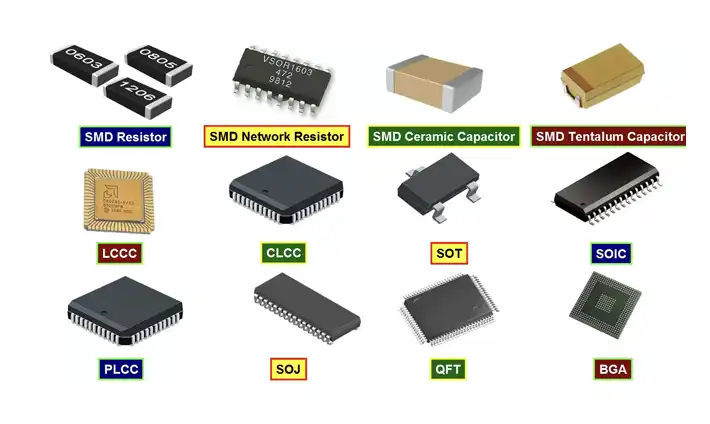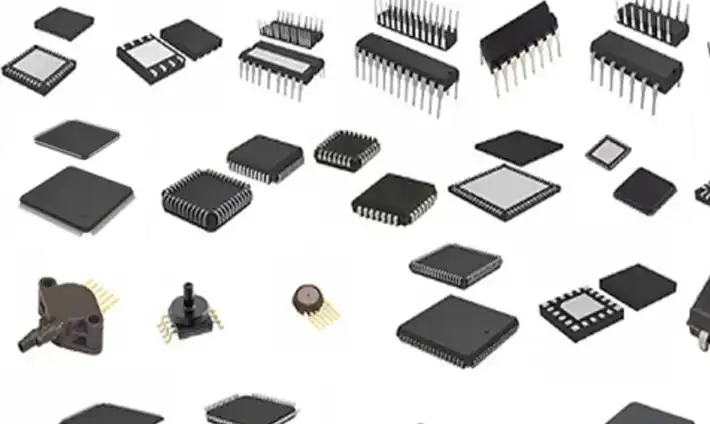In the realm of electronics, understanding the nuances of component package sizes is paramount.
These electronic component packages, ranging from minuscule to substantial, house the very heart of electronic devices.
Let’s embark on a journey through the vast landscape of electronic component package sizes, uncovering their significance and applications.
What is an SMD Package?

A SMD package, short for Surface-Mount Device package, is a type of casing or enclosure used for electronic components.
Unlike traditional through-hole components that have leads inserted into holes on a circuit board, SMDs are mounted directly onto the surface of the board. These packages are characterized by their small size, flat profile, and compatibility with automated assembly processes.
SMDs play a significant role in modern electronics due to their compactness, high component density, and suitability for miniaturized devices. They offer advantages such as improved high-frequency performance, smaller footprint, and enhanced reliability.
Surface-Mount Devices (SMDs):
SMDs represent a revolutionary packaging technology characterized by their diminutive size and compatibility with automated assembly processes. These flat, lightweight components have redefined electronic design, enabling the development of compact and lightweight devices.
Electronic Component Package Types

Here are various common electronic component packages in the following.
Dual In-Line Packages (DIPs): A Time-Honored Classic
DIPs, with their familiar rectangular shape and dual rows of leads, have been a staple in electronic manufacturing for decades. While less space-efficient compared to SMDs, DIPs remain relevant in certain applications, offering robustness and ease of prototyping.
Ball Grid Arrays (BGAs): Enhanced Thermal Performance
BGAs feature an array of solder balls arranged in a grid pattern beneath the component, allowing for improved thermal dissipation and electrical performance. These packages are commonly found in high-performance computing systems, where thermal management is critical.
Quad Flat Packages (QFPs): Balancing Performance and Size
QFPs strike a balance between compactness and accessibility, making them popular choices for a wide range of applications, including microcontrollers and memory devices. Their flat profile and gull-wing leads simplify assembly while offering adequate space for routing traces.
Electronic Component Package Sizes
Electronic components come in various package sizes, each designed for specific applications and requirements. Here are some common electronic component package sizes along with their dimensions:
Through-Hole Packages:
DIP (Dual Inline Package):
- Width: 7.62 mm (0.3 inches)
- Pin Pitch: 2.54 mm (0.1 inches)
- Length varies based on the number of pins.
TO-220:
- Width: 10.16 mm (0.4 inches)
- Length: 19.05 mm (0.75 inches)
- Height: 9.4 mm (0.37 inches)
TO-92:
- Width: 5.08 mm (0.2 inches)
- Length: 4.57 mm (0.18 inches)
- Height: 4.06 mm (0.16 inches)
Surface Mount Packages:
SMD 0805:
- Length: 2.03 mm (0.08 inches)
- Width: 1.27 mm (0.05 inches)
- Height: 0.76 mm (0.03 inches)
SOT-23:
- Length: 3.0 mm (0.118 inches)
- Width: 1.7 mm (0.067 inches)
- Height: 1.45 mm (0.057 inches)
QFP (Quad Flat Package):
Pitch: Typically ranges from 0.4 mm to 1.0 mm
Body size varies based on pin count.
Here’s a table summarizing the dimensions:
| Package Type | Length (mm) | Width (mm) | Height (mm) |
|---|---|---|---|
| DIP | Varies | 7.62 | – |
| TO-220 | 19.05 | 10.16 | 9.4 |
| TO-92 | 4.57 | 5.08 | 4.06 |
| SMD 0805 | 2.03 | 1.27 | 0.76 |
| SOT-23 | 3.0 | 1.7 | 1.45 |
| QFP | Varies | Varies | – |
These are just a few examples, and there are many more package sizes available depending on the specific requirements of the electronic component and the application it’s intended for.
SMD Package Sizes for Electronic Components
Surface-mount device (SMD) packages come in various sizes to accommodate different electronic components, including resistors, capacitors, inductors, and diodes. Here’s an overview of typical SMD package sizes for each component type, along with dimensions in millimeters (mm) and inches:
Resistors:
Resistors are passive electronic components that limit the flow of electric current. SMD resistors are available in several package sizes, each denoted by a standardized code.
| Chip Package Type | Dimensions (mm) | Dimensions (inches) |
|---|---|---|
| 0402 | 1.0 x 0.5 | 0.04 x 0.02 |
| 0603 | 1.6 x 0.8 | 0.063 x 0.031 |
| 0805 | 2.0 x 1.25 | 0.079 x 0.049 |
| 1206 | 3.2 x 1.6 | 0.126 x 0.063 |
Capacitors:
Capacitors store and release electrical energy. SMD capacitors come in a range of package sizes to suit different capacitance values and voltage ratings.
| Chip Package Type | Dimensions (mm) | Dimensions (inches) |
|---|---|---|
| 0201 | 0.6 x 0.3 | 0.024 x 0.012 |
| 0402 | 1.0 x 0.5 | 0.04 x 0.02 |
| 0603 | 1.6 x 0.8 | 0.063 x 0.031 |
| 0805 | 2.0 x 1.25 | 0.079 x 0.049 |
Inductors:
Inductors store energy in the form of a magnetic field. SMD inductors are available in various package sizes to meet different inductance and current requirements.
| Chip Package Type | Dimensions (mm) | Dimensions (inches) |
|---|---|---|
| 0402 | 1.0 x 0.5 | 0.04 x 0.02 |
| 0603 | 1.6 x 0.8 | 0.063 x 0.031 |
| 0805 | 2.0 x 1.25 | 0.079 x 0.049 |
| 1206 | 3.2 x 1.6 | 0.126 x 0.063 |
Diodes:
Diodes allow current to flow in one direction only. SMD diodes are available in various package sizes, typically denoted by codes such as SOD, SOT, and SMA.
| Chip Package Type | Dimensions (mm) | Dimensions (inches) |
|---|---|---|
| SOD-323 | 1.6 x 1.3 | 0.063 x 0.051 |
| SOT-23 | 3.0 x 1.7 | 0.118 x 0.067 |
| SMA | 5.0 x 3.2 | 0.197 x 0.126 |
These tables provide a glimpse into the diverse world of SMD package sizes for resistors, capacitors, inductors, and diodes, highlighting the dimensions in both millimeters and inches.
Comparison of Different SMD Components
Surface-mount device (SMD) components play vital roles in electronic circuits, each serving specific functions. Below is a comparison table highlighting key characteristics of various SMD components:
| Component | Function | Typical Package Sizes | Notable Features |
|---|---|---|---|
| Resistors | Limit current flow | 0402, 0603, 0805, 1206 | Small footprint, wide range of resistance values |
| Capacitors | Store and release electrical energy | 0201, 0402, 0603, 0805 | Various capacitance values, suitable for filtering and decoupling |
| Inductors | Store energy in the form of a magnetic field | 0402, 0603, 0805, 1206 | Used in filters, oscillators, and power supplies |
| Diodes | Allow current flow in one direction | SOD-323, SOT-23, SMA | Rectifier, signal demodulation, voltage regulation |
This comparison table offers insights into the functions, typical package sizes, and notable features of various SMD components, aiding in understanding their diverse applications in electronic circuits.
Common SMD Tantalum Capacitor Sizes
Tantalum capacitors are widely used in electronic circuits due to their high capacitance density and stability. Below is a table showcasing common surface-mount device (SMD) tantalum capacitor sizes:
| Package Size | Dimensions (mm) | Dimensions (inches) | Capacitance Range |
|---|---|---|---|
| A | 3.2 x 1.6 | 0.126 x 0.063 | 0.1 µF – 470 µF |
| B | 3.5 x 2.8 | 0.138 x 0.110 | 0.1 µF – 680 µF |
| C | 6.0 x 3.2 | 0.236 x 0.126 | 0.1 µF – 1000 µF |
| D | 7.3 x 4.3 | 0.287 x 0.169 | 0.1 µF – 2200 µF |
These common SMD tantalum capacitor sizes offer a range of dimensions and capacitance values, catering to various electronic circuit requirements.
Small Outline Transistor Package Types
Small Outline Transistor Packages (SOT) are compact, surface-mount device (SMD) packages commonly used for transistors and other semiconductor devices. Here are some common SOT package types:
- SOT-23: This is one of the smallest SOT packages, featuring three terminals and a compact footprint suitable for space-constrained applications.
- SOT-89: Slightly larger than SOT-23, the SOT-89 package offers improved power dissipation capabilities while maintaining a small form factor.
- SOT-223: With four terminals and a larger footprint compared to SOT-23 and SOT-89, the SOT-223 package provides better thermal performance, making it suitable for medium-power applications.
- SOT-323: Similar to SOT-23 but with a different lead configuration, SOT-323 packages offer flexibility in layout design while maintaining a small size.
Comparison of Small Outline Transistor Package Sizes
| Package Type | Dimensions (mm) | Terminal Configuration |
|---|---|---|
| SOT-23 | 3.0 x 1.75 x 1.3 | 3 terminals |
| SOT-89 | 4.5 x 2.6 | 3 terminals |
| SOT-223 | 6.7 x 3.7 x 1.8 | 4 terminals |
| SOT-323 | 2.1 x 2.1 x 0.9 | 4 terminals |
This table provides a comparison of common small outline transistor package types, including their dimensions in millimeters and terminal configurations.
Integrated Circuit (IC) SMD Package Sizes
Integrated circuits (ICs) are vital components in electronic devices, and they come in various surface-mount device (SMD) package sizes to accommodate different functionalities and applications. Here’s an overview of common IC SMD package sizes:
| Package Type | Dimensions (mm) | Terminal Configuration | Typical Applications |
|---|---|---|---|
| QFN (Quad Flat No-Lead) | Varies depending on size | Bottom-side terminals | Microcontrollers, RF modules |
| SOIC (Small Outline Integrated Circuit) | Varies depending on size | Gull-wing or J-lead terminals | Analog and digital ICs, voltage regulators |
| TSSOP (Thin Shrink Small Outline Package) | Varies depending on size | Gull-wing terminals | Memory chips, operational amplifiers |
| QFP (Quad Flat Package) | Varies depending on size | Gull-wing or J-lead terminals | Microprocessors, DSPs |
| BGA (Ball Grid Array) | Varies depending on size | Solder balls beneath the package | High-density memory, processors |
These package sizes provide options for manufacturers to select the most suitable form factor for their integrated circuits, considering factors such as size constraints, thermal management, and assembly processes.
FAQs
Are electronic component package sizes standardized?
Yes, there are industry-standard dimensions for various package types, ensuring compatibility and interoperability across different manufacturers.
What factors influence the choice of package size for electronic components?
Several factors, including space constraints, thermal considerations, assembly methods, and electrical requirements, influence package selection.
How do miniaturization trends impact electronic component package sizes?
Miniaturization trends drive the development of smaller and more compact package sizes, enabling the creation of sleeker and more portable electronic devices.
What are the advantages of surface-mount devices (SMDs) over traditional through-hole components?
SMDs offer advantages such as smaller footprint, higher component density, improved high-frequency performance, and suitability for automated assembly processes.
Can different package sizes affect the electrical performance of electronic components?
Yes, package sizes can influence electrical characteristics such as parasitic capacitance, inductance, and thermal resistance, thereby affecting the overall performance of electronic circuits.
Are there any emerging trends in electronic component packaging?
Yes, emerging trends include the development of advanced packaging technologies such as system-in-package (SiP) and chip-scale packaging (CSP), aimed at further miniaturization and integration of electronic systems.
Conclusion
In conclusion, electronic component package sizes play a pivotal role in shaping the landscape of modern electronics. From miniature SMDs to robust DIPs, these packages enable the realization of innovative devices across various industries. By understanding the nuances of package types and dimensions, engineers can make informed decisions to meet the ever-evolving demands of the electronics market.